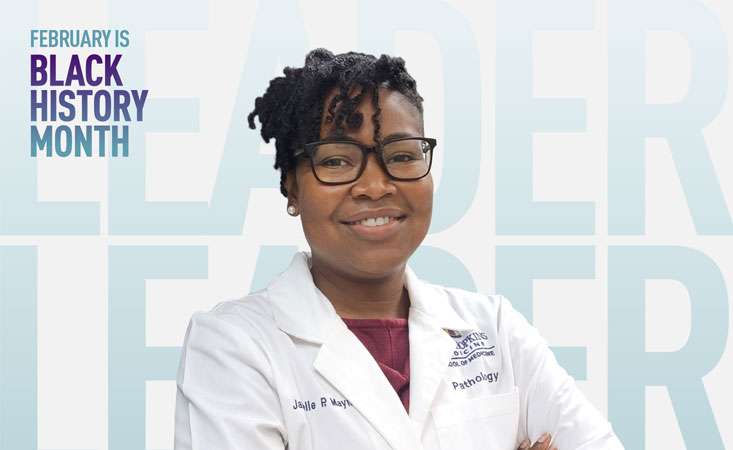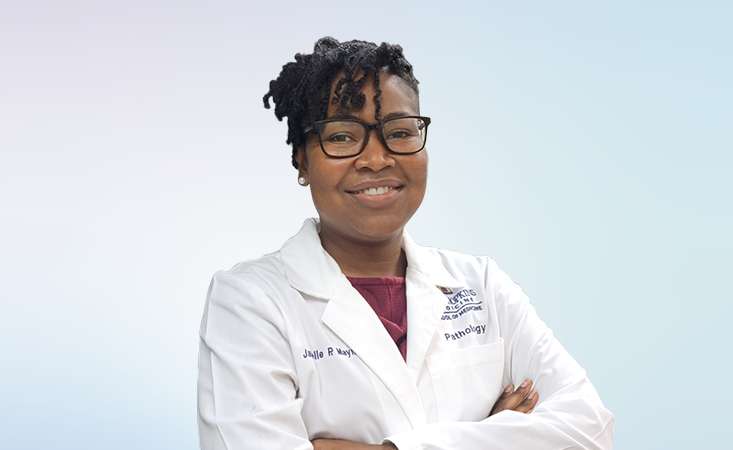Investigating disparities in pancreatic cancer – Pancreatic Action Network


Janielle Maynard, PhD
For some types of cancer, such as breast and prostate cancer, immune responses may vary depending on race and gender. This knowledge can help with diagnosis and treatment options.
Janielle Maynard, PhD, a 2022 PanCAN Career Development Award recipient and assistant professor of pathology and oncology at Johns Hopkins University School of Medicine, is studying these potential differences as they relate to pancreatic cancer and black and white patients. She is studying samples of the tissue surrounding a pancreatic tumor—the so-called microenvironment—to learn how the biology of black and white patients may differ.
“I want to understand how the cells behave in the tumor microenvironment,” she said. “And are there differences between different population groups in the context of racial differences?”
For some other cancers, the answer is yes. Researchers comparing patients of different racial and ethnic backgrounds have found important differences in the way cells in the tumor microenvironment interact with and respond to cancer. This has helped develop diagnostic and treatment approaches.
Dr. Maynard, whose PanCAN Career Development Award is generously funded by the Chrysalis Fund of the Ventura County Community Foundation, hopes her work will lead to similar discoveries in the field of pancreatic cancer. This is especially important as precision medicine—treatment tailored to the patient’s biology—continues to open up new options for patients.
A person’s genetic lineage is key to precision medicine. While race is a social construct, ancestry refers to the specific DNA a person passes on to the next generation.
“As humans, we are very similar in terms of our DNA,” she said. “We have, relatively speaking, very small differences, but those small differences can have a massive impact on how diseases develop, how diseases are diagnosed and how they are treated. So the more we know about an individual or groups of individuals, the better we can treat the different diseases they have.”
Although she delves deeply into the biology, Dr. Maynard is quick to point out that this is far from the only factor that influences who is diagnosed with pancreatic cancer and what the outcomes of the disease are. A complex web of factors is at play.
“We already know that socioeconomic factors contribute greatly to health care disparities in cancer,” she said. “How people live, what they eat, what toxins and pollutants they are exposed to, and what access they have to prevention and treatment after diagnosis, and so on. I don’t want to overlook that.”
The goal is to address both sides of the equation – socioeconomic and biological – while focusing on improving patient outcomes and quality of life.
A crucial step—and another part of her PanCAN-funded work—is to examine racial disparities in pancreatic cancer more broadly. This means compiling data sets comparing black and white patients to try to tease out meaningful differences.
“This allows us to look at all the things we know to be true about pancreatic cancer and ask ourselves if they are true for the African-American population as well,” she said. “Is there anything that might be unique and stand out because of ancestry or because of similar dietary habits of this population, etc.? Is there anything that might give us more information about how to target or diagnose the disease?”
Although this work is important, she believes it is difficult to finance.
“I was very grateful to PanCAN for awarding this grant and to the Chrysalis Fund of the Ventura County Community Foundation for the funding,” she said. “Sometimes it can be risky. You would rather someone had a dataset already, but that groundwork needs to be done so we can ask these important questions.”
A native of St. Kitts and Nevis, Dr. Maynard’s long-standing fascination with science and the human body led her to a career in the laboratory. Although she initially considered going into medicine, she was immediately convinced when she learned during her undergraduate studies at Howard University that she could help people by focusing exclusively on research.
She then completed a PhD program in translational biology at Baylor College of Medicine, which combined her passion for research with a focus on real-world outcomes, particularly health disparities.
As research programs continue to focus on engaging scientists from diverse backgrounds, she is optimistic that the diversity of the workforce will be reflected in projects.
“If you’re from South Africa, you want to learn about South African patients,” she said. “If you’re from the African-American community, you want to learn about that population. So those people are more willing to ask those questions and make sure the resources are available to do that.”
Dr. Maynard is optimistic that patients will ultimately benefit from better early detection and treatment methods.
“My hope is that when we have a more diverse population — in my case, I’m looking at blacks and whites — when we diagnose a patient, we can say, ‘You fit this profile and you’re probably better off getting this therapy,'” she said. “Or maybe we’ll see a direct link to some kind of exposure and we can limit that exposure to prevent disease in the first place. We’ll only know if we really look. That’s what I’m starting to work on — watching and seeing what we can learn.”



